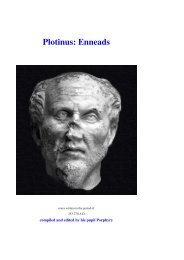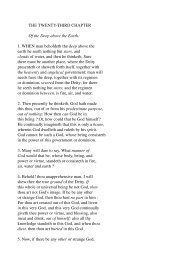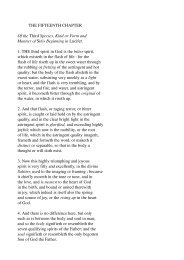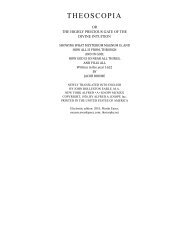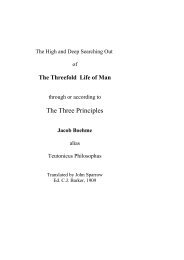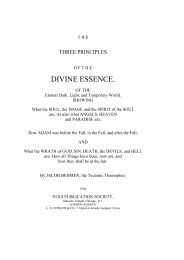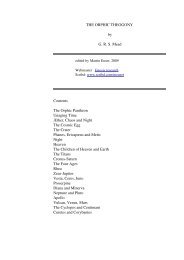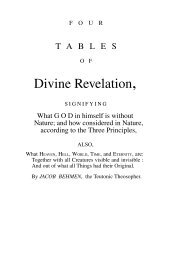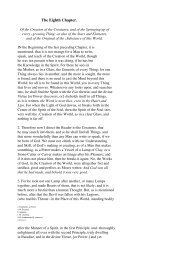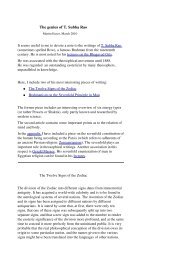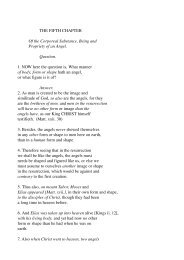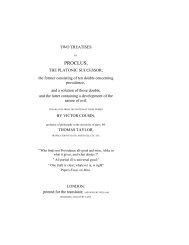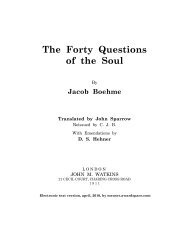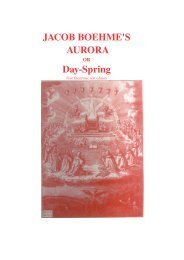Gerald Massey's Lectures - Society in evolution - Awardspace
Gerald Massey's Lectures - Society in evolution - Awardspace
Gerald Massey's Lectures - Society in evolution - Awardspace
You also want an ePaper? Increase the reach of your titles
YUMPU automatically turns print PDFs into web optimized ePapers that Google loves.
the human descent of the Christ; he who had once accepted the gospel of the Christ made<br />
flesh, but rejected it when he had learned to know better. This they did because their<br />
Christ was spiritual, not an historic Jesus; and the same reason holds good as an<br />
explanation for Paul. He repudiated the va<strong>in</strong> genealogies employed <strong>in</strong> va<strong>in</strong> by those who<br />
sought to establish a human l<strong>in</strong>e of descent for the Christ, because he rejected the fleshandblood<br />
Jesus who was preached by the advocates of Historic Christianity. This be<strong>in</strong>g<br />
so, it follows that the open<strong>in</strong>g passage of the Epistle to the Romans, which now looks like<br />
Paul's first utterance to all the world, beg<strong>in</strong>s the tale of the <strong>in</strong>terpolations, and thus<br />
appears <strong>in</strong> the right place, for it stands nearly alone <strong>in</strong> the writ<strong>in</strong>gs of Paul, with its frank<br />
or forced acknowledgment of the humanity of Jesus, by admitt<strong>in</strong>g the Word made flesh to<br />
be of the seed of David. But the Christ of Paul could not, at one and the same time, have<br />
been "without genealogy" and yet be of the seed of Abraham or David. That would be a<br />
complete reversal of his teach<strong>in</strong>g, who, <strong>in</strong> reject<strong>in</strong>g the genealogies, had already<br />
repudiated the descent from David. Moreover, Barnabas, the most <strong>in</strong>timate friend of Paul<br />
and fellow-teacher with him, who, as a Gnostic, denied the human nature of the Christ,<br />
and, like Paul, spoke disrespectfully of the other Apostles--Barnabas assures us it was<br />
accord<strong>in</strong>g to the error of the wicked that Christ was called the Son of David. Paul also<br />
tells us that no "man can say that Jesus is the Lord, but by the Holy Spirit" (1 Cor. xii. 3),<br />
and therefore not through the facts of an external history, or human pedigree.<br />
The Christ of the Gnosis was not connected with place any more than personality, or l<strong>in</strong>e<br />
of human descent. His only birthplace was <strong>in</strong> the m<strong>in</strong>d of man. Consequently, <strong>in</strong> his<br />
gospel, Marcion, who was a Gnostic Christian, does not connect his Christ with Nazareth.<br />
His Christ is not Jesus of Nazareth. And this note of the Gnosis is apparent <strong>in</strong> the writ<strong>in</strong>gs<br />
of Paul. His Christ is nowhere called Jesus of Nazareth, nor is he born at Bethlehem,<br />
either of the Virg<strong>in</strong> Mary, or of Mary the wife of Cleopas, who was not the Virg<strong>in</strong>. Of<br />
course, either an historic Jesus could become the Christ, as Saviour of the world, or he<br />
could not; and, as the world never was lost <strong>in</strong> any such sense as the ignorant have derived<br />
from a fable mis<strong>in</strong>terpreted, why he could not, and as he could not, then he did not, and<br />
Paul who was an Adept <strong>in</strong> the mysteries, a Master of the Hidden Wisdom, could never<br />
have mistaken the fable for a fact on which to build his system of Christology; nor could<br />
he accept it from others. When once we have got the Gnostic clue to the Hidden Wisdom,<br />
we f<strong>in</strong>d an universal argument amongst the Gnostics concern<strong>in</strong>g their tenets. Wherever<br />
we meet with them they give us the Masonic grip; and by the same sign we know that<br />
Paul was a Gnostic. This is further corroborated by his own claim to have been an Adept,<br />
a wise master-builder, one who spoke wisdom amongst the Perfected. He was a Gnostic<br />
<strong>in</strong> the supreme degree, and all Gnostics agree that the Christ of the Gnosis could not be<br />
made flesh, and therefore all are, and must be opposed to Historic Christianity, Paul<br />
<strong>in</strong>cluded. It was as a Gnostic, a wise master-builder, that Paul laid the foundations which<br />
others built upon; and the superstructure they reared became the Church of Historic<br />
Christianity. The Gnostics were Christians <strong>in</strong> an esoteric sense, but not because they<br />
expla<strong>in</strong>ed a human history esoterically. There was no history to expla<strong>in</strong> until the myth<br />
had been made exoteric by those who were ignorant, or who cunn<strong>in</strong>gly converted the<br />
Gnosis <strong>in</strong>to history. It was the work of Peter to make the mysteries exoteric <strong>in</strong> a human<br />
history. It was the work of Paul to prevent this be<strong>in</strong>g effected by expla<strong>in</strong><strong>in</strong>g the Gnosis.<br />
H<strong>in</strong>ts of this appear <strong>in</strong> the Epistles when he speaks of his gospel, and the revelation of his<br />
mystery concern<strong>in</strong>g the Christ, and warns his disciples aga<strong>in</strong>st the preach<strong>in</strong>g of that<br />
"other gospel" and "other Jesus," which are opposed to his own truer teach<strong>in</strong>g. As when<br />
he tells Timothy to "remember Jesus Christ accord<strong>in</strong>g to my gospel," and says to the<br />
Romans, "establish you accord<strong>in</strong>g to my gospel;" that was the gospel of the Gnosis which<br />
he had brought to them.<br />
We are also able to watch the <strong>in</strong>terpolators of his writ<strong>in</strong>gs at their work. The tamper<strong>in</strong>g<br />
with the text of Paul's Epistles is still made apparent by a comparison of the various



